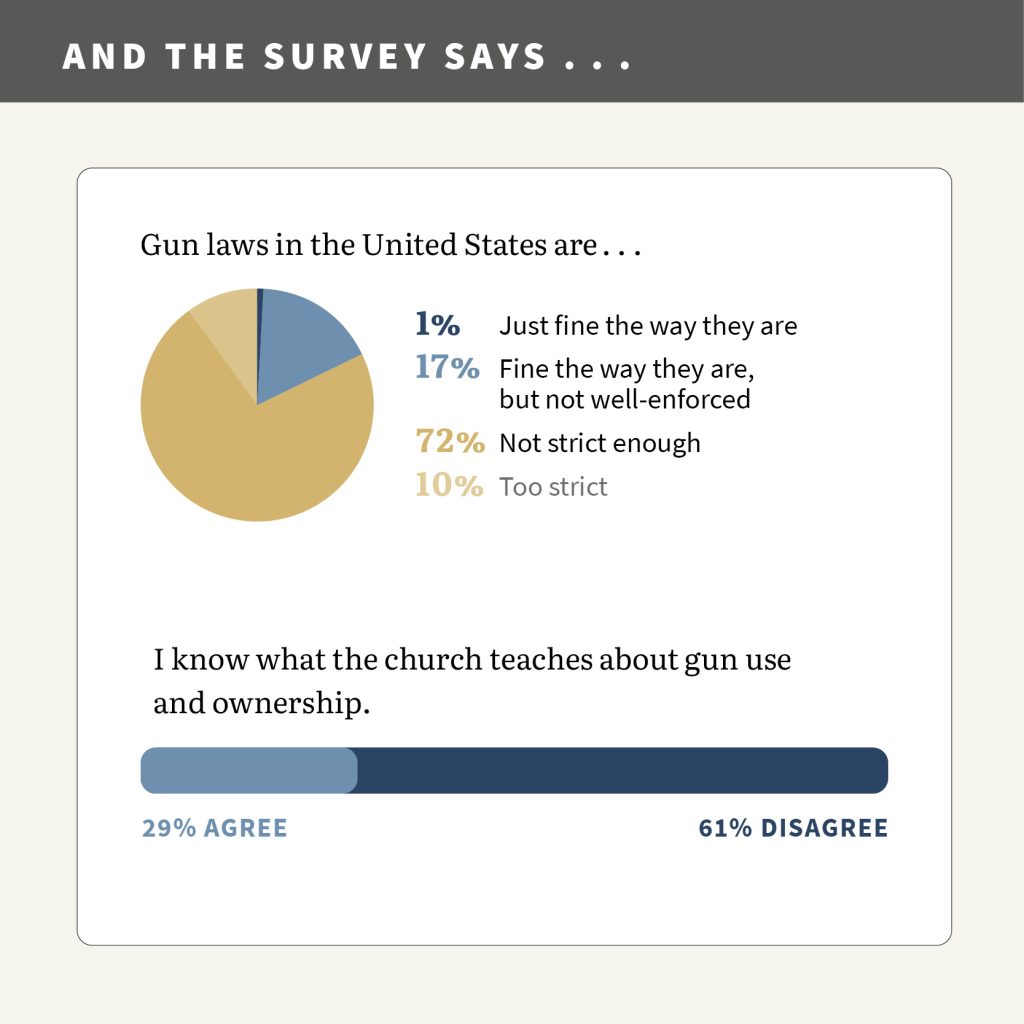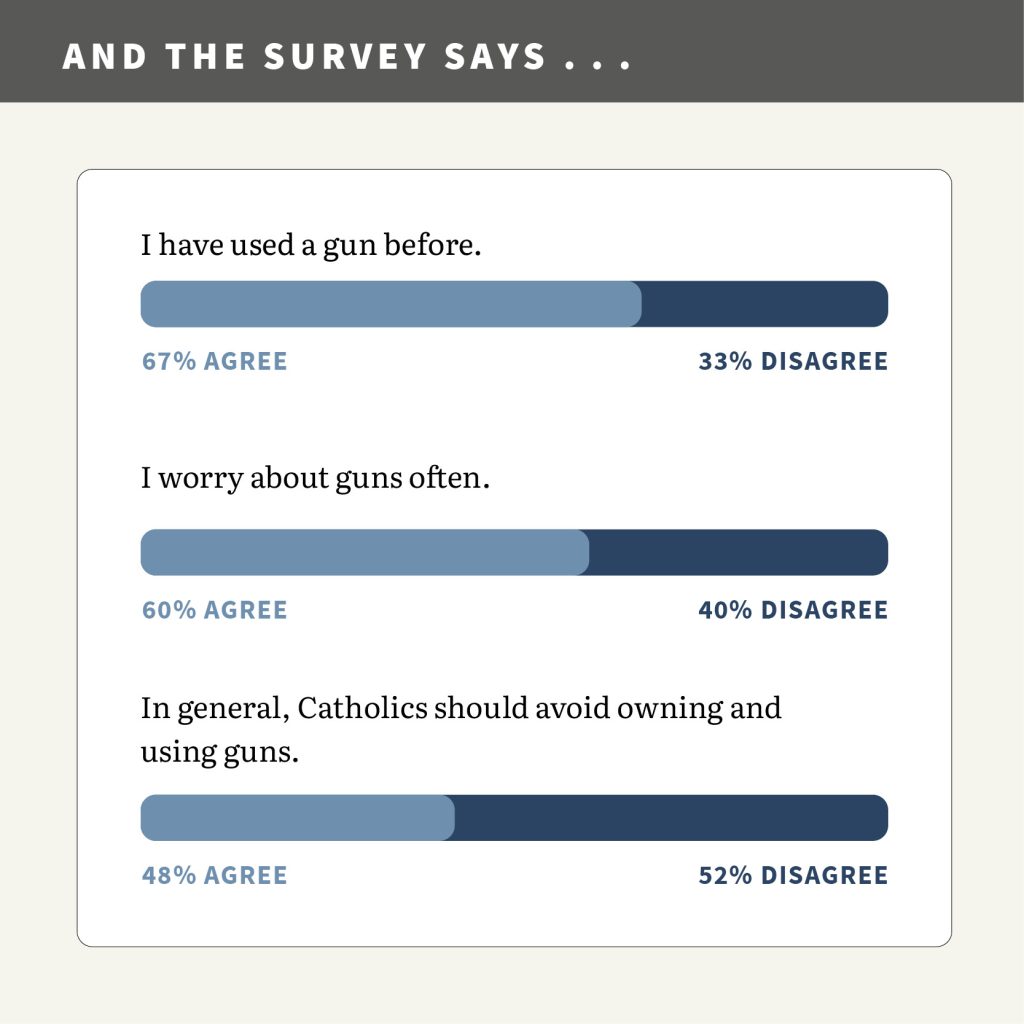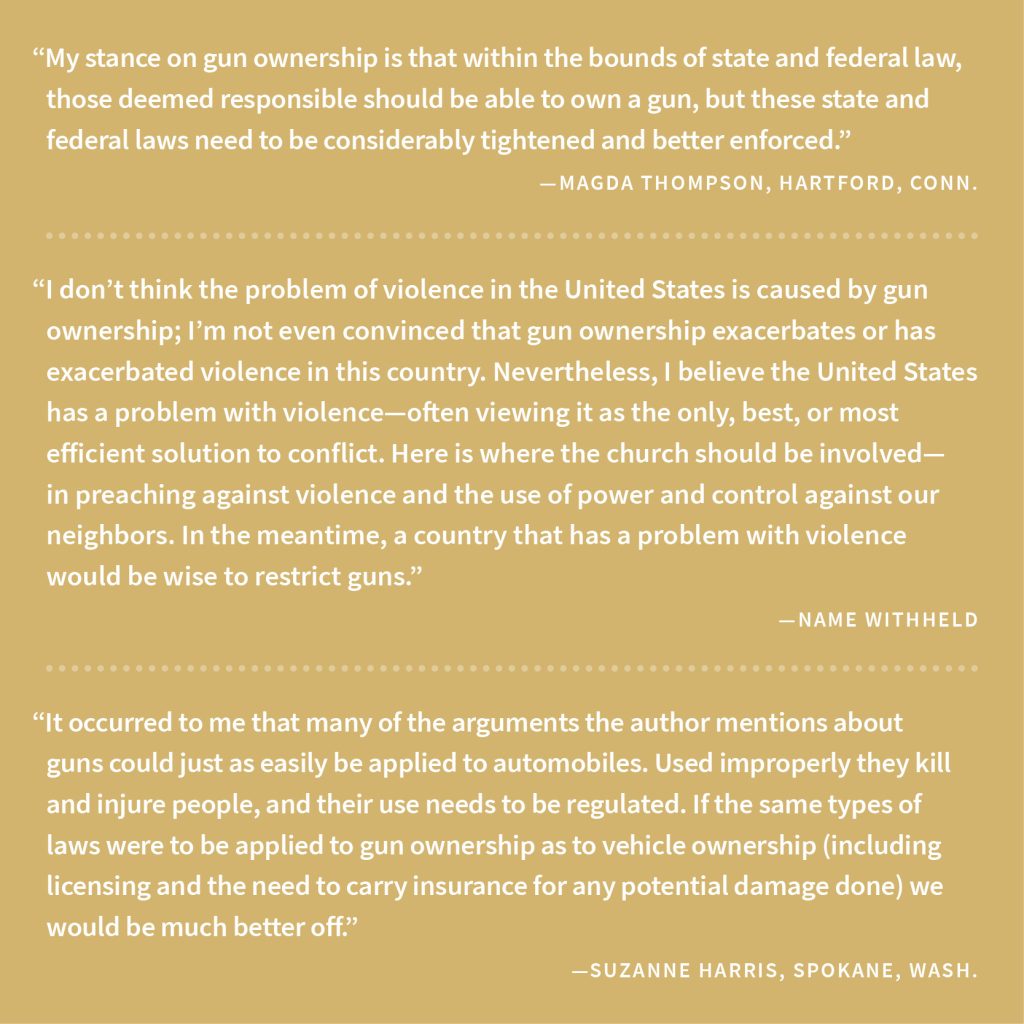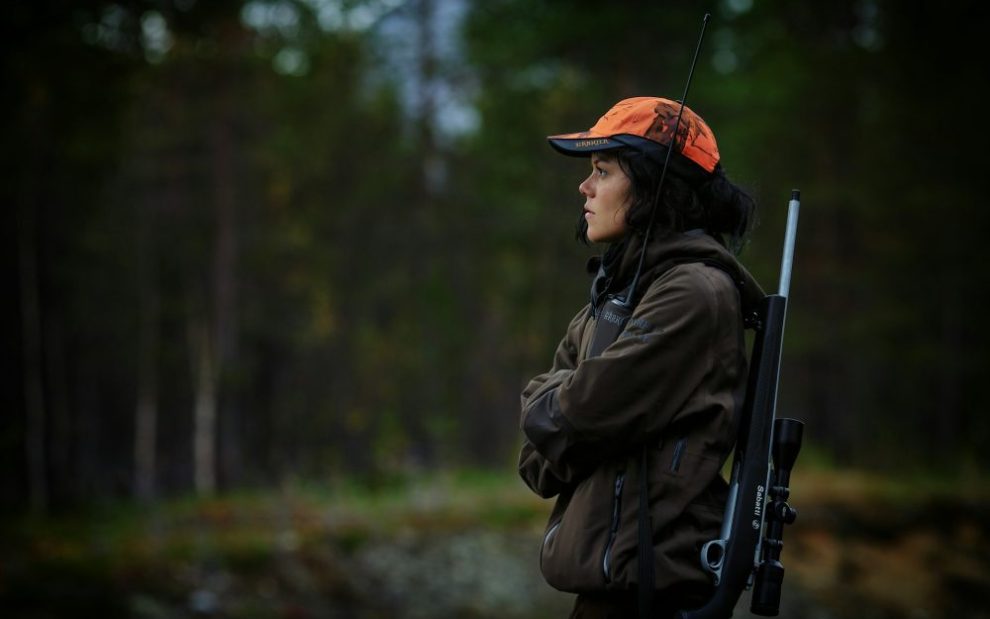For our Sounding Board column, U.S. Catholic asks authors to argue one side of a many-sided issue of importance to Catholics around the country. We also invite readers to submit their responses to these opinion essays—whether agreement or disagreement—in the survey that follows. A selection of the survey results appear below, as well as in the June 2024 issue of U.S. Catholic. You can participate in our current survey here.
In spring of 2020, 89-year-old Buell Hall was shot in the throat while sitting in his home near the village of Freeport, Ohio. The shooter, Jagger Miller, didn’t intend to hurt him. He was simply firing into the woods for fun. Even when people shouted that he’d hit someone, Miller kept shooting.

Hall survived but was left with chronic pain and PTSD. The shooting was ruled an accident, and Miller was charged with first-degree misdemeanor assault, for which he was sentenced to 60 days incarceration. After serving half his sentence, Miller appeared in court to ask that the remainder be suspended. Prior to his hearing, Miller, who had never apologized to Hall or his family, was laughing and smiling. When I reported on the case for my local newspaper, I found it hard not to inject moral judgment into my article. The bulk of my ire was directed not at Miller, but at our morally disordered gun culture.
This is not because I dislike guns per se. I own and shoot guns myself, but I also understand why many of my fellow progressive Christians are critical of firearm use. Given the rampant violence in our society, I believe anyone owning lethal weapons has an obligation to use them ethically.
When I bought my first firearm, I was a libertarian, with the usual libertarian attitudes about gun control. I’ve altered my views over the years, and I now believe we need rigorous gun legislation. I also understand that in owning guns I may be at odds with gospel principles of nonviolence.
Nonetheless, firearms remain prevalent in my community, and understanding how to use them is practical, not because of some imaginary scenario where I blast the “bad guys,” but because sometimes a gun needs to be handled, assessed, and unloaded. At present I don’t hunt, but hunting can be a more ethical food source than factory farms. There are also times when a wild animal needs to be put down, and animal control is not available.
Still, critics of gun culture might find these pragmatic considerations insufficient. They might even view the phrase ethical gun owner to be an oxymoron, considering what guns represent in U.S. culture.
According to the most recent statistics from the U.S. Centers for Disease Control and Prevention, more than 50 people die from gun violence every day in this country. Gun-related killings constitute over 80 percent of all homicides in the United States, compared with 4 percent in England and Wales, 11 percent in Australia, and 40 percent in Canada. The United States far surpasses all other nations when it comes to the number of school shootings.
Some gun advocates blame this on violent video games—but violent video games are also popular in Singapore, Japan, and South Korea, which have the lowest global rates of gun violence. Others point to decline in religious affiliation—but some of the least religious nations also have low rates of gun violence. A common mantra among gun enthusiasts is that “it’s not a gun problem, it’s a heart problem.” But that doesn’t explain why our hearts are so set on violence.
One factor that does seem relevant is that we have a lot of guns. The United States has the highest rate of civilian gun ownership in the world, with 120 firearms per every 100 people. And there’s no evidence that those who identify as disciples of the Prince of Peace are more inclined to eschew gun ownership. The rates of gun ownership are higher among white evangelicals than they are among U.S. residents on the whole. Like it or not, I need to consider the possibility that simply by owning guns, I am part of the problem.
This isn’t something many gun owners want to hear. Following mass shootings, gun sales tend to go up. Sometimes, especially when the buyers are women or people of color, this is due to an increased sense of insecurity. But sometimes it is because people are afraid that the government will take their guns away. When “Joe the Plumber” wrote an open letter to the parents of mass shooting victims, stating “your dead kids don’t trump my constitutional rights,” people reacted with shock and disgust. But he was stating what many gun owners believe.
Here’s the reality: If you refuse to make even the smallest sacrifice for the sake of safety, you’re not a hero, and you don’t really care about defending people. If your response to a mass shooting is to rush out and buy more guns, you’re not an advocate for life. And you probably shouldn’t be anywhere near a tool created for the purpose of killing.
Most gun owners know better than to shoot randomly into the woods for amusement. Many adhere rigorously to the basics of gun safety: Treat all guns as loaded, don’t load your gun until you’re ready to use it, don’t touch the trigger until you’re ready to shoot, never point a gun at anything you don’t intend to shoot, and be sure of your target and what’s beyond it. But many don’t.

The common argument against gun control that “when guns are outlawed, only outlaws will have guns” ignores the injuries and deaths that occur due to carelessness. Nationally, about half of all nonfatal firearm injuries are the results of accidents. Children are especially at risk for accidental shooting injuries, and I’ve read sheriff reports about calls to homes near me where firearms were in easy reach of children.
Our culture’s romanticization of guns doesn’t help. Songs, movies, and television reinforce the myth that a “good guy with a gun” will solve rather than exacerbate problems. My local feed stores sell house signs saying things like “come and take it” or “this house is protected by God and a gun.”
Given this context, I’ve thought a lot about what ethical gun ownership means in our society. Obviously, people who do things like shoot into the woods for fun or leave guns where children can find them should not have firearms. But the safety rules are just the baseline. Ethical gun ownership means assessing where one stands in relation to the common good.
Some questions to ask include: How does my firearm use affect my community? Are people’s lives better or worse for the fact that I own guns? Do I shoot in a way that disturbs the peace, annoys neighbors, alarms animals, or wakes napping babies?
How about the way I present myself with my guns? Do I flaunt firearms to intimidate others? Do I consider how gun rhetoric might affect those who have been harmed by gun violence? Am I respectful of the legitimate fears of those who don’t feel comfortable around guns? Do I pose with guns in my social media posts? Do I fantasize about violence or position myself as a macho hero? Do I make sweeping generalizations about classes of people as the “bad guys”? Do I make a habit of solving problems by means of intimidation or aggression? If so, I might not be ethically mature enough to be trusted with a gun.
Maybe the biggest moral consideration when it comes to ethical firearm ownership is whether I have formed an unhealthy attachment to a tool that is intended for killing. Here’s a test of this. If facts showed that giving up my gun privileges would help create a more just and life-affirming society, would I be willing to do that?
If I’m not ready to have that conversation, I really am part of the problem.

This article also appears in the June 2024 issue of U.S. Catholic (Vol. 89, No. 6, pages 21-25). Click here to subscribe to the magazine.
Image: Unsplash/Vidar Nordli-Mathiesen















Add comment